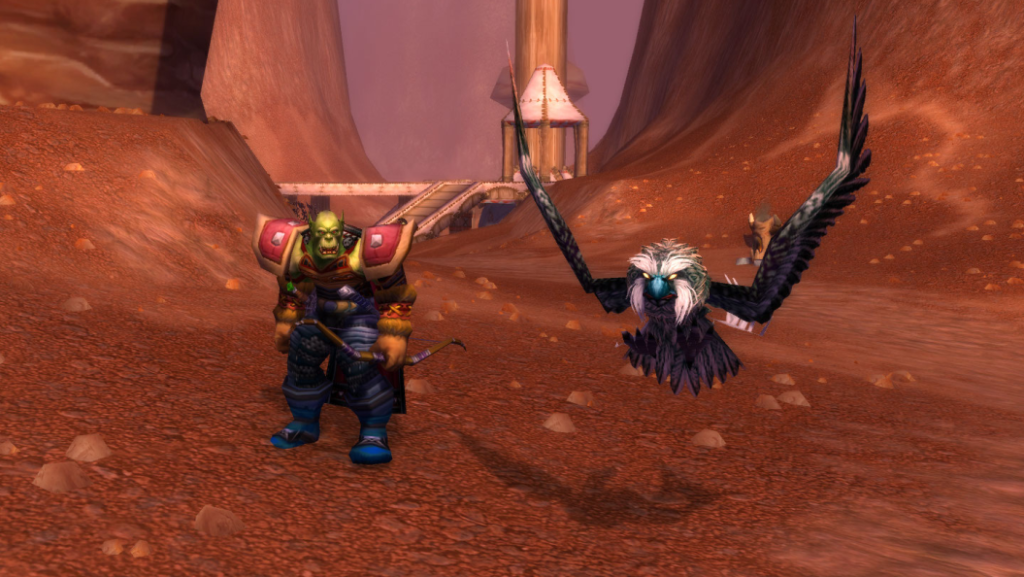- Author: churchvibez
- Date: February 3, 2025
- Updated: February 14, 2025
- Expansion: WoW Classic
As a Hunter in Classic WoW, your choice of pet plays an important role in your performance in both PvE and PvP. Whether you’re leveling, raiding or doing battlegrounds, the right pet can make a significant impact on how you play.
The best pets for specific tasks are easy to obtain. However, there are a few pets that require extra effort and dedication to tame. For example, Broken Tooth is widely regarded as the best pet for PvP due to its incredibly fast attack speed, which helps with pushback against casters.
The best Hunters go above and beyond. They not only seek out the most optimal pets but are also willing to tame them at lower levels and invest the time needed to level them up to 60 for use at max level.
Lupos
Lupos was an incredibly popular wolf on private servers due to its unique ability to deal shadow damage, which bypassed armor and caused high damage against every class.
In Classic, however, pet stats and abilities are normalized across the same family. This means that Lupos no longer deals shadow damage and its damage output is now on the same as other wolves in the game, meaning it no longer holds any mechanical advantage.
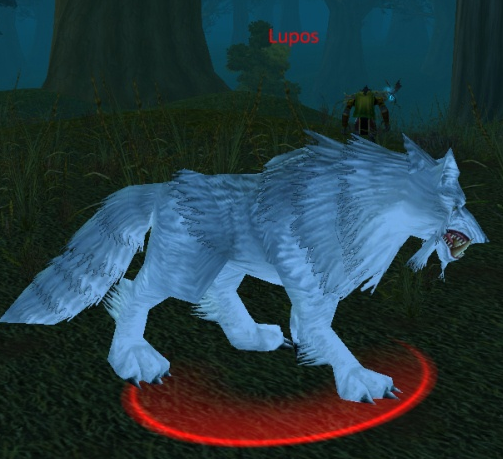
Lupos used to be sought after by every Hunter.
Overview
Hunter pets can be categorized into three groups:
- Offensive – Low tankiness, high DPS.
- General – Balanced tankiness and DPS.
- Defensive – High tankiness, low DPS.
Family | Category |
|---|---|
Offensive | |
Defensive | |
Defensive | |
General | |
Offensive | |
Defensive | |
Defensive | |
Defensive | |
General | |
Offensive | |
Offensive | |
Defensive | |
Offensive | |
Defensive | |
Defensive | |
Offensive | |
General |
Every Hunter pet falls into one of these categories, and the category determines the coefficients for the pet’s tankiness and damage output. As is discussed in the leveling section below, offensive pets are the most preferred due to their high DPS coefficients and, often, faster attack speeds.
This preference for offensive pets is not limited to leveling – it extends into other types of content, such as dungeons, raiding, and PvP. While tanky pets may have their uses in some niche situations, the higher damage potential of offensive pets makes them the optimal choice.
That said, when selecting a pet, it’s important to consider the pet family and its abilities, rather than only focusing on attack speed.
Leveling
Hunter leveling is heavily reliant on your pet’s ability to consistently hold threat. The best pet for leveling is the one that can generate enough threat to allow you to DPS freely without pulling aggro on mobs.
Defensive pets, while tanky and able to withstand more damage, tend to have more damage per hit. However, this correlates to a slower attack speed, meaning less threat is done overall.
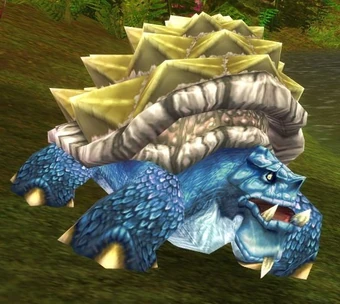
Despite being able to withstand heavy attacks, turtles fall into the category of defensive pets, making them less admirable as companions.
Offensive pets are the opposite, the threat modifier from these pets is slightly higher which, along with a fast attack speed, makes them the preferred choice while leveling.
This means that you have two options for offensive pets, depending on your preference and situation.
Cat – Single Target
For fights involving a single mob, ![]() Cats are the optimal choice. Cats tend to have the fastest base attack speed available, allowing them to maintain threat and deal high damage while doing so.
Cats are the optimal choice. Cats tend to have the fastest base attack speed available, allowing them to maintain threat and deal high damage while doing so.
Cats with Growl and Bite/Claw on autocast will produce the best possible threat in single target fights.
When it comes to two mobs, a Cat is still viable if you melee one mob while your pet tanks the second. However, if you prefer to avoid melee weaving and stick to full turret gameplay when dealing with two or more mobs, Bats or Owls become better options due to their AoE threat generation.
Bat/Owl – Multiple Mobs
For situations involving multiple mobs, ![]() Bats and
Bats and ![]() Owls shine thanks to Screech, which generates AoE threat.
Owls shine thanks to Screech, which generates AoE threat.
A bat or owl with Screech and Growl on autocast will reliably hold threat on multiple targets, allowing you to focus more on dealing damage from afar. These pets, however, typically become effective at higher levels, making them a solid choice for later leveling.
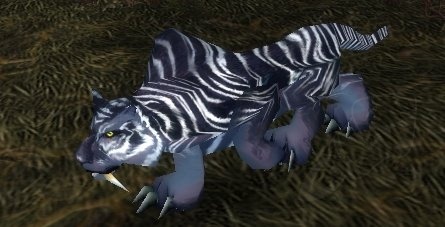
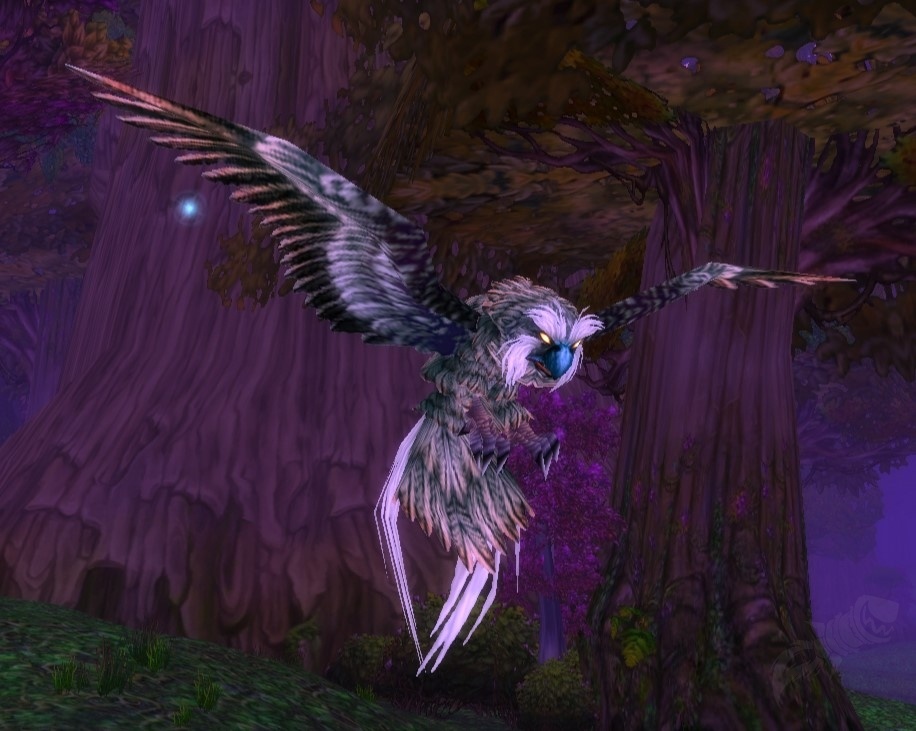
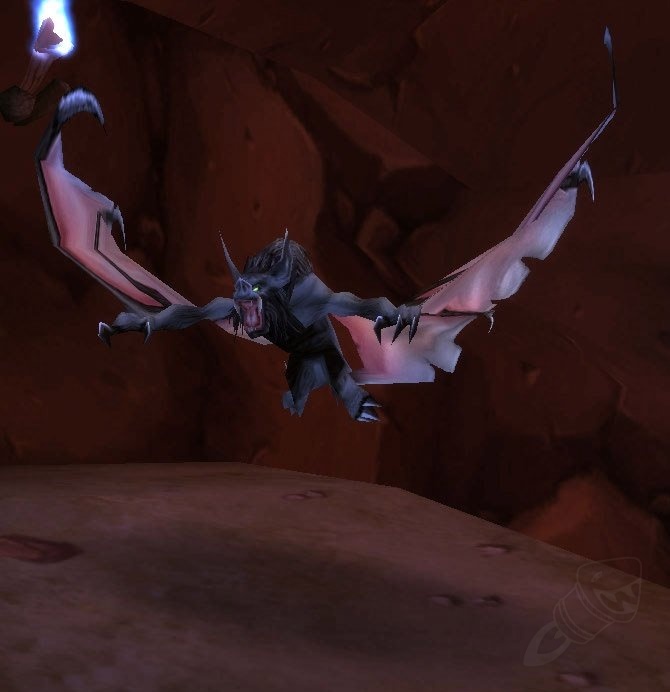
Cats, Owls and Bats are widely regarded as the best leveling companions.
Once you’ve decided on a pet family, finding the pet with the fastest possible attack speed in that family is critical for efficient leveling. While some of the fastest attacking pets are high level and require taming later, there are lower level alternatives that are more suitable.
Many Hunters tame their pet around Level 10 and stick with it all the way to Level 60 (unless they specifically tame Broken Tooth at level 37).
Switching pets at higher levels for leveling is generally not recommended unless necessary. Newly tamed pets will need to regain loyalty and training points, meaning their damage and threat generation will be suboptimal until they catch up.
Recommended Pets for Leveling
Cat
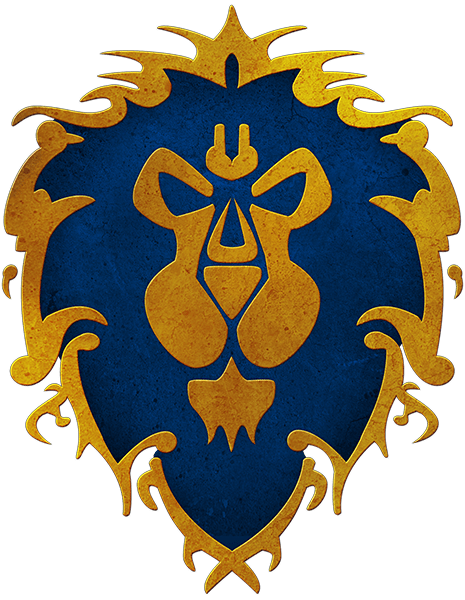 Alliance
Alliance
Name | Level | Location | Notes |
|---|---|---|---|
10-11 | Favored by hunter speed levelers. Located just outside Auberdine, making it a convenient choice for   Night Elves. Night Elves. | ||
5-6 | Best option for   Dwarves who don’t want to travel to Kalimdor. Dwarves who don’t want to travel to Kalimdor. |
 Horde
Horde
Name | Level | Location | Notes |
|---|---|---|---|
10 | Second fastest attack speed in the game. Best early leveling pet for Horde, but has a ~30-minute respawn timer. | ||
7-8 | Best alternative to The Rake for level 10s who want a fast-attacking Cat without competing for a rare spawn. | ||
15-16 | Good choice for those who didn’t tame an early Cat. Still viable for leveling without needing major loyalty recovery. |
Bat/Owl
Should a Hunter choose to level with a Bat or an Owl, the options are easier choose from, as each faction has several bats/owls in one zone and they all bear the same 2.0 attack speed.
Bats and Owls, however, do not start off with Screech. The best course of action is to train either Bite or Claw initially and then learn Screech later on.
 Alliance (Owls)
Alliance (Owls)
Name | Level | Location | Notes |
|---|---|---|---|
8-9 | Recommended for learning Claw 2 before leaving Teldrassil, as Owls cannot learn Bite. | ||
5-6 | Good early leveling pet. Should be replaced once Screech is learned. | ||
7-8 | Should level up and reset training to use Screech instead of Claw. |
 Horde (Bats)
Horde (Bats)
Name | Level | Location | Notes |
|---|---|---|---|
8-9 | Will need to be leveled to 10 to be effective. | ||
9-10 | Used to train Bite 2 before switching to a stronger Bat. | ||
10-11 | An alternative for Bite 2 if you didn’t tame a Vicious Night Web Spider. |
Screech
The options for Screech are very limited, as it has to be obtained from a higher level Bat/Owl before training it to your pet. Below is a table from where the best options to get Screech are while leveling.
Rank | Name | Level | Location |
|---|---|---|---|
1 | 16-17 | ||
2 | 32-34 | ||
3 | 48-49 | ||
3 | 50-52 | ||
4 | 56-58 | ||
4 | 57-59 |
Due to the location of Greater Fleshripper, Screech 1 is difficult to obtain for Hunters on Horde, meaning most will default to learning Screech 2 whenever they reach the Thousand Needles.
Once a Hunter is able to teach their pet Screech, they should reset all of their points at a pet trainer, then learn Screech and Growl. These should both be on autocast for the most effective results.
Training Points
Pet training points are earned as your pet levels and increases loyalty. For leveling, prioritize training points as follows:
- Natural Armor
- Bite/Claw
- All Rank 1 of the following:
– Frost Resistance
– Arcane Resistance
– Nature Resistance
– Shadow Resistance
– Fire Resistance - Great Stamina
Natural Armor is the most valuable passive ability for leveling, as it reduces the physical damage your pet takes. Great Stamina is less impactful as your pet often won’t have full health when engaging it’s next mob, meaning it should only be taken as a last resort when all other abilities have been learned.
Resistances beyond Rank 1 are situational and depend on the zone you’re leveling in. For instance, if you’re in Burning Steppes or Searing Gorge, it is more beneficial to learn a higher rank of Fire Resistance for your pet.
Dungeons and Raids
Most Hunters can get away with using the same Cat they leveled with for dungeons and raids, as Cats remain the best option for personal DPS. However, pets generally lack the ability to generate significant single target or AoE threat or defensiveness compared to regular tanks.
Since the difference in DPS between pets in dungeons and raids is very minimal, the best pet in these scenarios is the one that provides the most utility.
Wolf
![]() Wolves are a good choice for boosting group DPS in dungeons and raids due to Furious Howl. This ability buffs the next physical attack of all party members within 15 yards, making it valuable in melee groups.
Wolves are a good choice for boosting group DPS in dungeons and raids due to Furious Howl. This ability buffs the next physical attack of all party members within 15 yards, making it valuable in melee groups.
Furious Howl is exclusive to Wolves and should always be set to autocast, along with Bite and Dash, to maximize its effectiveness.
To unlock Furious Howl (Max Rank 4) and Bite (Max Rank 8), you need to tame a Bloodaxe Worg in Lower Blackrock Spire. However, taming this Worg can be challenging to do solo as it is located deep within Lower Blackrock Spire, a raid which has high level elite mobs. Therefore, you should bring a group for the run and inform your party beforehand that you’ll need to tame this Wolf. If you only want to learn the abilities rather than keep the Wolf as your pet, make sure to stable your main pet before entering the raid.
Bat/Owl
![]() Bats and
Bats and ![]() Owls are also considered to be one of the best pets for dungeons and raiding due to their Screech, which lowers the melee attack power of mobs affected by it. This debuff is useful as it stacks with similar abilities like Demoralizing Shout.
Owls are also considered to be one of the best pets for dungeons and raiding due to their Screech, which lowers the melee attack power of mobs affected by it. This debuff is useful as it stacks with similar abilities like Demoralizing Shout.
Most raids require at least 1 Hunter to have an Owl for Screech. To ensure maximum uptime, it should be the only ability on autocast in dungeons and raids. Avoid enabling Claw or Bite, as they can interfere with the uptime of the debuff.
The highest rank of Screech (Rank 4) can be learned by taming either a Monstrous Plaguebat in Eastern Plaguelands or a Winterspring Screecher in Winterspring.
Cat
While providing no real utility to the raid, ![]() Cats remain a solid alternative for Hunters who do not wish to retame their current cat used while leveling.
Cats remain a solid alternative for Hunters who do not wish to retame their current cat used while leveling.
Both Dash and Claw should be set to autocast during dungeons and raids raids, but Hunters should be careful in encounters with fear mechanics. If a pet is feared while dashing, it may run into additional packs of mobs, which can potentially cause a wipe.
The highest rank of Claw (Rank 8) can be learned from either an Elder Shardtooth or a Winterspring Screecher in Winterspring.
Training Points
The way you prioritize your pet’s training points in dungeons and raids depends on two key factors:
- Pet Family – determines which active abilities your pet should have.
- Raid/Dungeon Location – determines which passive abilities, such as resistances, are most valuable.
All active abilities, such as Furious Howl, Screech, and Claw, must be learned by taming specific creatures in the world. Meanwhile, passive abilities, like resistances and armor, can be trained at a pet trainer once your pet reaches the appropriate level.
Active Abilities
For active abilities, follow this priority list and acquire the highest rank possible of each ability for your pet family when possible. These abilities should then be left on autocast in dungeons and raids:
Passive Abilities
The raid or dungeon you do will determine which passive abilities should be prioritized. In general, dungeons are not difficult enough to require changing your pet’s training points. However, in raid content, it is highly recommended to spec your pet’s resistances to match the damage type that is taken in the raid.
For each raid, train resistances in the following order, training the specific rank and then progressing to the next one until your training points are spent. Once all necessary active abilities and resistances are covered, any remaining points should be allocated into Great Stamina.
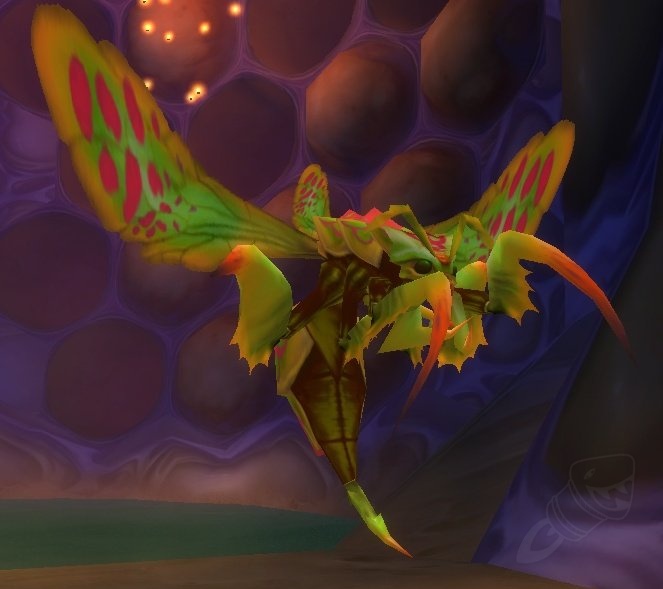
Princess Huhuran’s Acid Spit ability does high nature damage, so Nature Resistance on your pet is crucial.
PvP
In both world PvP and battlegrounds, there are various preferences that you can choose as your pet, as it ultimately depends on the scenario you are in. In general, the biggest desire is attack speed, as faster attacks cause more frequent spell pushback against casters. Because of this, Broken Tooth is widely considered to be the best Hunter pet for PvP. However, Wind Serpents, despite having slower attack speeds, are also viable in certain PvP situations due to their ranged abilities.
Cat (Broken Tooth)
Broken Tooth is the fastest-attacking pet in the game, with a base attack speed of 1.0, making it the best pet for disrupting spellcasting. This makes ![]() Mages,
Mages, ![]() Warlocks, and
Warlocks, and ![]() Priests significantly weaker when faced with a Hunter using this Cat, as the cast time of their spells can effectively be doubled while Broken Tooth is attacking them.
Priests significantly weaker when faced with a Hunter using this Cat, as the cast time of their spells can effectively be doubled while Broken Tooth is attacking them.
However, taming Broken Tooth is difficult, as it has a 7-8 hour respawn timer and spawns in three different locations in the Badlands. Competition for Broken Tooth throughout the expansion is fierce, which makes it the most contested pet in the game.
![]() Cats are also the only pet family with Prowl, making them a great choice for
Cats are also the only pet family with Prowl, making them a great choice for 
 Night Elf Hunters who use Shadowmeld. This synergy is extremely effective in Arathi Basin, as Hunters can defend bases while remaining in stealth with their pet.
Night Elf Hunters who use Shadowmeld. This synergy is extremely effective in Arathi Basin, as Hunters can defend bases while remaining in stealth with their pet.
In battlegrounds and world PvP, having the highest rank of Dash is essential. If a Hunter sends their pet after a ![]() Rogue or
Rogue or ![]() Druid who enters stealth, the pet will continue to chase them; this is crucial to not lose track of any stealth class.
Druid who enters stealth, the pet will continue to chase them; this is crucial to not lose track of any stealth class.
While Broken Tooth, and cats in general, are the best option against casters and cloth users, they are less effective against heavily armored melee classes like ![]() Warriors and
Warriors and ![]() Paladins.
Paladins.
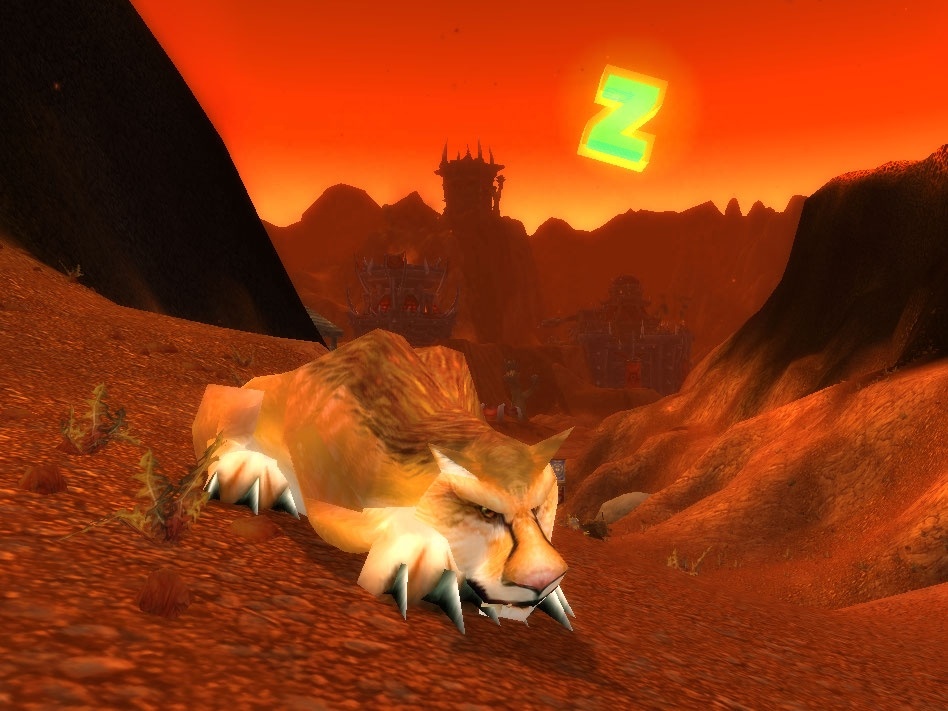
Broken Tooth is widely regarded as the best Hunter pet for PvP.
Wind Serpent
![]() Wind Serpents are a strong choice in PvP against heavy armor users due to Lightning Breath, which ignores armor. Unlike physical pet abilities, this ability deals pure spell damage, allowing it to bypass high armor values against classes that can typically block or mitigate most physical attacks.
Wind Serpents are a strong choice in PvP against heavy armor users due to Lightning Breath, which ignores armor. Unlike physical pet abilities, this ability deals pure spell damage, allowing it to bypass high armor values against classes that can typically block or mitigate most physical attacks.
Another advantage of Lightning Breath is that it can be cast from range. This is particularly useful in PvP scenarios where keeping a player in combat is crucial. For example, if a player is trying to mount and run away, or a nearby ![]() Rogue is about to go back into Stealth, a wind serpent can keep them in combat from ranged.
Rogue is about to go back into Stealth, a wind serpent can keep them in combat from ranged.
Boar
![]() Boars are an interesting alternative in PvP because they have the only crowd control ability available to Hunter pets – Charge. This ability immobilizes a target for a 1 second.
Boars are an interesting alternative in PvP because they have the only crowd control ability available to Hunter pets – Charge. This ability immobilizes a target for a 1 second.
Charge can be useful for rooting a play that is either chasing or running away from the Hunter, for example a ![]() Mage attempting to get into a Hunter’s melee range to Frost Nova them.
Mage attempting to get into a Hunter’s melee range to Frost Nova them.
Training Points
Active Abilities
Cat
Hunters using a Cat should prioritize training the highest rank of Dash, Prowl, and Claw.
- Claw should be autocast at all times.
- Prowl and Dash should be manually toggled depending on the situation.
Wind Serpent
Wind Serpent users should prioritize getting the highest rank of Lightning Breath and Dive. Lightning Breath 6 is the highest rank but only possible to obtain after Zul’Gurub releases.
- Lightning Breath 6 6 – Son of Hakkar
- Lightning Breath 5 5 – Hakkari Sapper
For Dive (Rank 3), Hunters can train it from:
- Carrion Vulture – in Eastern Plaguelands
- Ironbeak Hunter – in Felwood
- Winterspring Owl – in Winterspring
Lightning Breath should be on autocast, while Dive should be manually toggled when needed.
Boar
Boar users should train Charge, Dash, and Bite.
- Bite should be autocast at all times.
- Charge and Dash should be manually toggled depending on the situation.
For Charge 6, Hunters can train it from:
Passive Abilities
Passive abilities in PvP are highly situational and should be chosen based on the classes you frequently face. If you struggle against ![]() Mages, it’s best to invest in Frost Resistance and Arcane Resistance. Against
Mages, it’s best to invest in Frost Resistance and Arcane Resistance. Against ![]() Warlocks, Shadow Resistance and Fire Resistance are more valuable. Nature Resistance can also be useful against
Warlocks, Shadow Resistance and Fire Resistance are more valuable. Nature Resistance can also be useful against ![]() Druids.
Druids.
In general, Hunters tend to struggle most against Mages and Warlocks due to their ability to crowd control both the Hunter and their pet.
- Mages can Frost Nova a Hunter in place to deadzone them
- Warlocks can use Fear to send a pet running, removing any spell pushback and an important part of the Hunter’s damage.
Therefore, after training your pet’s active skills, you should prioritize:
After these, you can allocate the remaining 15 training points based on the most frequent classes that you face.:
- Arcane Resistance 2 – useful against Mages who tend to Polymorph your pet.
- Nature Resistance 2 – useful against Druids who tend to Entangling Roots or Nature’s Grasp your pet.

